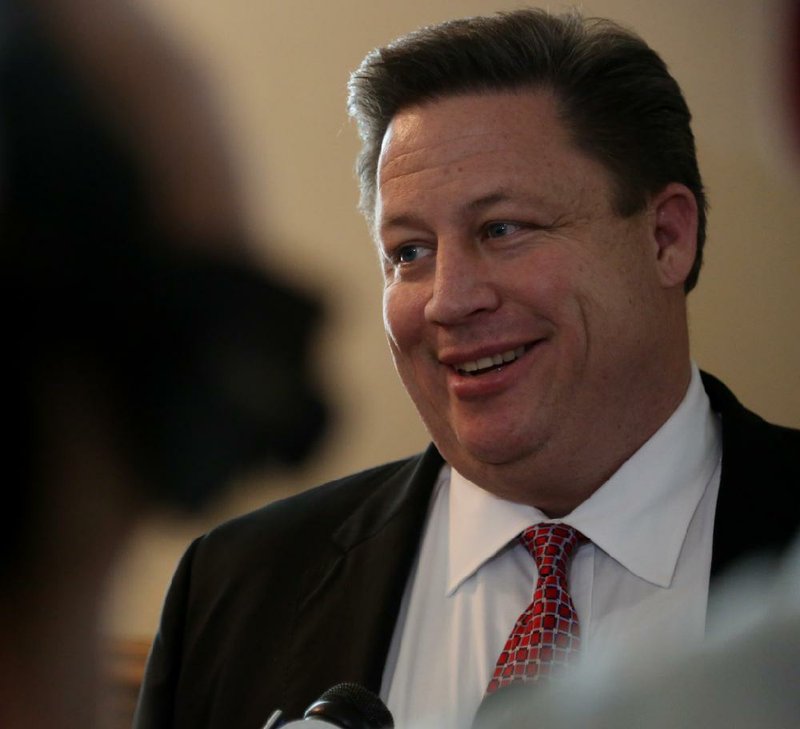The Arkansas Supreme Court on Thursday rejected all but one of the 10 contempt citations charged against defense attorney Bill James during the first manslaughter trial of a fired Little Rock police officer.
The ruling leaves James with a $500 fine, a substantial reduction from the original fine of $25,000 imposed by Circuit Judge Wendell Griffen a year ago.
Griffen later reduced the penalty to $5,000, recognizing he did not have the authority to fine James more than $500 per violation.
The high court on Thursday, in a ruling written by Justice Karen Baker with an endorsement by fellow Justice Cliff Hoofman, cleared James of most of Griffen's accusations of wrongdoing.
The justices upheld the remaining charge because James admitted to it to the judge, according to the decision.
The Supreme Court found that the attorney had only once violated rules Griffen set limiting disclosure about the criminal background of two key prosecution witnesses -- Jeremiah Johnson and Keontay Walker, who were 14 and 17 at the time.
James said he did nothing wrong and is considering petitioning the high court to reconsider its finding that there was one violation.
"I'm very excited the Supreme Court agreed with us on nine of them," James said Thursday, while praising his lawyer, Jeff Rosenzweig. "I don't feel like I violated any of the court's rulings."
James said his "admission" cited by the high court was not an acknowledgement of wrongdoing to the judge but rather an effort to quickly conclude a bench conference with the judge that had interrupted his opening statement to the jury.
James was representing Josh Hastings, who had been charged with manslaughter for fatally shooting 15-year-old Bobby Joe "Weedy" Moore III while investigating complaints about vehicle break-ins at an apartment complex. Moore was a car burglary suspect who had been driving a car that Hastings contended had tried to run him over.
Walker was Moore's front-seat passenger, and Johnson was in the back. The teens testified they had all been breaking into cars that August 2012 night.
Police and prosecutors disputed that Hastings was in any danger, questioning whether the car was even moving toward him. They accused Hastings of firing into the car without knowing who was inside the vehicle, an act they said was criminally reckless. Hastings was fired in part for breaking police procedure by positioning himself in front of the car and opening fire.
Prosecutors tried Hastings twice, with both trials ending with jurors unable to agree with the required unanimous verdict, before they dropped the case in April, saying they did not believe they could ever convince a jury that Hastings had committed a crime.
At Hastings' first trial, Griffen determined that James had broken his disclosure rules 10 times, first during his opening statement to the jury and then when he cross-examined the two teenagers.
But the judge called James out only once about breaking the rules, notifying the lawyer in that bench conference during opening statements that James would be held in contempt. Griffen informed James about the other violations after the June 2013 trial concluded.
The Supreme Court nullified the nine other violations Thursday, ruling that James had not broken the rule at those times.
"James cannot be held in contempt for not following what the circuit court meant to order but can only be held in contempt for violating the circuit court's express commands," the decision states. "Based on the record before us, we cannot say that James's conduct violated the circuit court's order and therefore, substantial evidence does not support the circuit court's finding of contempt."
Griffen was also wrong not to have notified James each time the judge felt the attorney had broken the rules. James had a constitutional right to be informed of each violation as soon as it occurred, the high court ruled.
"The circuit court was required to notify James of the accusation and provide James a reasonable time to make his defense," the ruling states. "The circuit court erred by denying James notice and a reasonable time to make his defense."
Citing laws that protect juvenile criminal records from disclosure, Griffen barred disclosure at the trials that the teens were each on probation for earlier convictions and the offenses that had gotten them convicted.
Griffen said James could only raise the issue of their juvenile crimes in the context of whether being on probation would have made them more likely to cooperate with the police investigation. The judge barred James from raising the issue of their criminal past for the purpose of showing their character or establishing their state of mind at the time of the shooting.
Metro on 06/27/2014


